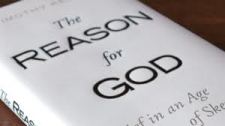I was asked by Peter Harrison on Richard Dawkins’ forum to explain what God is, exactly. He took issue with the fact that God is the same as His attributes. Read on…
Peter: “What” is the same as “attributes”? Watch this for a short introduction to why what you say is nonsense: http://www.richarddawkins.net/forum/viewtopic.php?f=3&t=57739&st=0&sk=t&sd=a” — That thread contains a link to this YouTube video: www.youtube.com/watch?v=1IyJp5dak9M by eightfootmanchild
I posted this in that thread yesterday after lunch and am awaiting response: Put anything else in existence in the position of ‘x’ in “What is ‘x’?” How do we describe x? Isn’t it by defining its attributes? If you rule out such description and insist that x must not exist if all one can provide is a list of attributes–then… nothing exists. Is there not an already-established title for this fallacy? … “Perhaps it would help others understand what exactly you mean by “primary characteristics” if you provided ONLY the primary characteristics of yourself (eight foot manchild), or of “the human” in general.
Before I answer “What is God?” — a warm-up:
“The Platonic idea of a univocal concept whose Form remains constant does not fit our experience with language. Further, whatever form our finite expressions may have, it does seem to be a gross form of verbal idolatry to suppose that such forms can convey to us the very essence of an infinite and transcendent God. … And this essence no finite mind, ideas, or words can capture,” (310-312, Geisler and Feinberg, “Intro. to Philo. / A Christian Perspective”). With all that in mind, I will do my best to explain this.
What is God? What is the essence of God?
God (eternal; “I AM that I AM”) transcends beyond, and is imminent within, the temporal – and though the two are distinct types of being (eternal and temporal), they are not divorced from each other. The eternal can affect the temporal, but the temporal never affects the eternal unless the eternal allows it (for example, all prayer requests are granted both within the temporal, and beyond the beginning of time). Eternal God is unchanging: (Ps. 102:25-27; 1 Samuel 15:29; Mal. 3:6; Hebrews 1:10-12; Heb. 6:18; Titus 1:2; James 1:17). He intimately, lovingly interacts from within and beyond the temporal. This is what enabled Him to communicate with us on our level through the Son’s incarnation without breaking unity between the Father, Son and Holy Spirit, and is what enables our sovereign God to allow our free will (without which love is impossible), answer our prayers, and react appropriately to every temporal situation within His eternal happiness. “…God is an eternal and entirely independent Being. He is not dependent on anything in the created universe for what He ‘is.’ And being a simple (indivisible) Being, whatever He ‘has’ He is. That is, His attributes are identical to His essence or nature. So if God has knowledge, then he is knowledge. This means that while the objects of His knowledge are distinct from His nature, God’s knowledge of them is identical to His eternal and independent nature. Thus, God’s knowledge is independent of anything outside Himself,” (52, Geisler, “Chosen But Free”). Same deal with love (and His other positive attributes) as with knowledge–all primary, because He is simple and unchanging. “God’s attention does not pass from thought to thought, for His knowledge embraces everything in a single spiritual co-intuition. For if God is simple, then His thoughts are not sequential but simultaneous. He does not know things inferentially but intuitively,” (ibid). “In brief, God can know the potential as well as the actual. And the future is potential. The future preexists in Him as its primary cause [“In him we live, and move, and have our being” (Acts 17:28)]. So God knows the future in advance by knowing Himself,” (111, ibid). [The future is only ‘potential’ in the sense that it ‘preexists’ rather than ‘exists right now’. The ‘present moment’ is only ‘actual’ in the sense that it ‘exists right now’. I say that because in other contexts (especially when discussing the view of Neotheists), ‘potential’ and ‘actual’ carry different meanings.] Being simple and eternal, God’s essence, or virtue, is His existence (He is pure actuality, did not have to ‘develop’ virtue, and exists eternally), whereas our essence, or virtue, precedes our existence (we have potential, develop virtue, and exist temporally). “That is, nothing is accidental to the being (existence) of a necessary Being. Whatever God ‘has,’ that He is—essentially,” (111, ibid). That is why God ‘is’ love, and to be made in His image is to be made with the potential to love [“he has given us his very great and precious promises, so that through them you may participate in the divine nature,” (2 Peter 1:4)]. All of our other abilities that make us unique as humans, such as creativity, contemplation, and so on, are (or should be) in service to the main ability to love. Because He is eternal love, and because love is impossible outside relationship, He is eternal relationship: Father, Son, and Holy Spirit. God wills in accordance with His essential, good nature, and it is this love-nature that spoke the universe, from beginning to end, into existence, knowing His love is made evident to the world through the promised sacrifice of the Son. If we break unity with Him, the ground of being, it limits our entire essence (our understanding of and ability to fully love), but it does not destroy it—we still exist apart from Him and love the way the world loves, but we are incomplete and cannot enjoy the fullness of His love apart from Him.
Love defined:
http://bible.crosswalk.com/Concordances/TorreysTopicalTextbook/ttt.cgi?number=T349
http://www.godandscience.org/love/biblicallove.html









